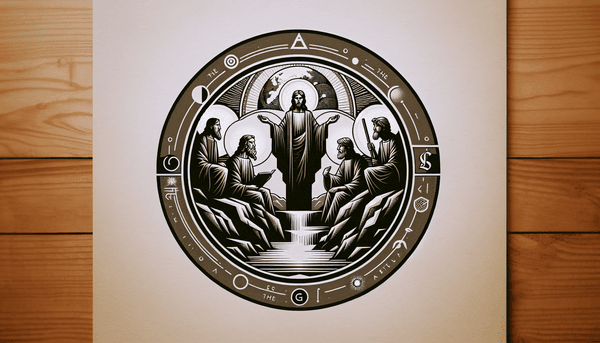The Divine Father-Son Relationship
The bond between God the Father and Jesus is profoundly depicted in the Gospels, where divine proclamations leave no doubt about Jesus's identity as God's Son. The voice from heaven at Jesus's baptism in Matthew 3:17 declares, 'This is my Son, whom I love; with him I am well pleased.' This affirmation is echoed during the Transfiguration, as detailed in Mark 9:7 and Luke 9:35, where the Father's voice commands attention to His chosen Son. The apostle Peter reflects on this in 2 Peter 1:17, where he recalls the honor and glory Jesus received from God the Father. These moments are not merely historical footnotes; they are foundational to the Christian understanding of Jesus's unique sonship and mission.
The Divine Nature of Jesus
The Gospel of John opens with the profound statement, 'In the beginning was the Word, and the Word was with God, and the Word was God' (John 1:1). This verse, along with Jesus’s own proclamation in John 10:30, 'I and the Father are one,' firmly establishes the divine nature of Christ. In Colossians 2:9, the apostle Paul writes of the fullness of deity residing bodily in Christ, and in Philippians 2:6, he speaks of Jesus, who, existing 'in very nature God,' chose humility over divine privilege. These scriptures collectively testify to Jesus's eternal existence and equality with God, inviting believers to recognize and embrace His divinity. For a deeper understanding of how this divine connection extends into our human relationships, explore our article on Harmony and Partnership: The Biblical Blueprint for Relationships.
Hope and Discipline as Anchors for the Soul
Hope and discipline are presented in the scriptures as vital components for a steadfast life in faith. The author of Hebrews describes hope as an 'anchor for the soul, firm and secure' (Hebrews 6:19), suggesting that it is hope that keeps believers grounded amidst life's tumultuous seas. Discipline, on the other hand, is championed in Proverbs as necessary for wisdom and correction (Proverbs 12:1). The scriptures call believers to be immovable, always excelling in the Lord’s work, knowing that their labor in the Lord is not in vain (1 Corinthians 15:58). Such discipline and hope are not burdens but gifts that guide towards spiritual maturity and the ultimate promise of salvation.
Conclusion
As we have journeyed through the scriptures, we have witnessed the profound declarations of God the Father concerning Jesus, the heartfelt confessions of Jesus as Lord, and the rich tapestry of texts affirming His divine nature. These biblical themes are not just relics of the past; they resonate with timeless relevance, offering guidance and comfort to believers today. The journey of faith is marked by the pursuit of understanding, the stability of hope, and the transformative process of discipline and forgiveness. In a similar vein, the intricate structure and depth of Psalm 119 invite us into a deeper meditation on scripture. May this exploration inspire a deeper engagement with the enduring truths of the Christian faith, and may the Word continue to be a living testament of God's love and grace.
FAQ
Q: What does the Bible say about staying anchored?
A: The Bible uses the metaphor of an anchor to describe hope as a stabilizing force in our lives; 'We have this hope as an anchor for the soul, firm and secure' (Hebrews 6:19). Hope, grounded in God’s promises, keeps us steady in the faith.
Q: What is the biblical perspective on discipline?
A: Discipline is seen as a path to wisdom and growth. Proverbs 12:1 says, 'Whoever loves discipline loves knowledge, but whoever hates correction is stupid.' Discipline helps mold character and aligns us with God's will.
Q: What does the Bible say about forgiveness?
A: Forgiveness is central to the message of the Bible. 1 John 1:9 assures us that 'If we confess our sins, he is faithful and just and will forgive us our sins and purify us from all unrighteousness.' Forgiveness reflects God’s mercy and is integral to reconciliation.
Q: How does the Bible describe the divine nature of Jesus?
A: The Bible affirms the divine nature of Jesus in several passages, including John 1:1, 'In the beginning was the Word, and the Word was with God, and the Word was God,' showing that Jesus is both distinct from and one with God.






